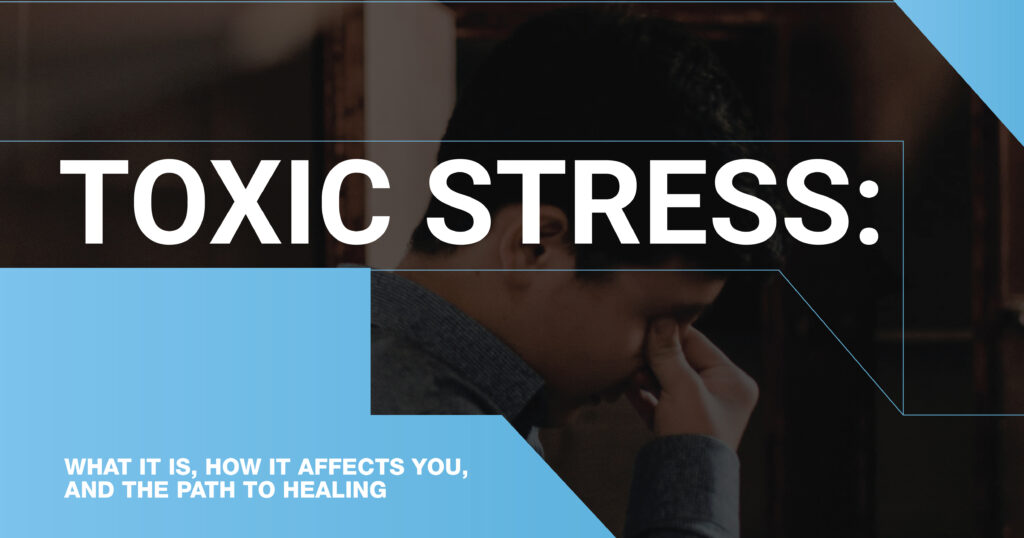In today’s relentless, high-pressure world, stress is often brushed off as just part of the grind. But not all stress is created equal. While some stress can spark motivation or help us meet deadlines, toxic stress is a far more insidious force – one that can erode your mental clarity, physical health, and emotional stability if left unchecked.
At Clear Mind Treatment, we’re dedicated to helping individuals break free from the grip of toxic stress through compassionate, evidence-based outpatient care. This comprehensive guide will unravel what toxic stress is, how it impacts your life, and the actionable steps you can take to reclaim your well-being.
What Is Toxic Stress?
Toxic stress isn’t just feeling overwhelmed after a tough day – it’s the body’s stress response system stuck in overdrive, triggered by prolonged adversity without enough support to counterbalance it. Unlike acute stress, which fades after a challenge is resolved (think pre-presentation jitters), toxic stress lingers, often rooted in deep-seated trauma, instability, or chronic hardship. Without protective relationships or coping tools, it can fundamentally alter how you navigate the world.
Toxic stress often stems from experiences like childhood abuse, neglect, or growing up in an unstable environment – perhaps with a caregiver struggling with mental illness or addiction. It can also arise from adult challenges, such as unrelenting workplace burnout, financial insecurity, or ongoing relational conflict, like a high-stakes divorce. These circumstances don’t just test your resilience – they can overwhelm it, embedding stress deep within your body and mind.
The Far-Reaching Effects of Toxic Stress
Toxic stress doesn’t just make you feel “off” – it reshapes how your brain and body function, with consequences that ripple across every facet of life. Below, we explore its profound impact.
Rewiring the Brain and Emotions
Chronic stress can alter neural pathways, making it harder to think clearly or regulate emotions. You might notice difficulty concentrating, frequent forgetfulness, or a sense of emotional rawness. Over time, this can manifest as anxiety, depression, post-traumatic stress disorder (PTSD), or burnout, leaving you feeling trapped in a cycle of overwhelm.
Taking a Toll on Physical Health
The body bears the brunt of toxic stress through elevated levels of stress hormones like cortisol and adrenaline. Over time, this can lead to serious health issues, such as high blood pressure, heart disease, or a weakened immune system that makes you more prone to illness. Digestive problems, like irritable bowel syndrome, and sleep disruptions, from insomnia to chronic fatigue, are also common.
Straining Relationships
Toxic stress can erode the trust and connection that sustain relationships. You might find yourself withdrawing from loved ones, struggling to communicate without snapping, or feeling isolated as emotional exhaustion takes hold. These challenges often lead to misunderstandings or conflicts, further deepening a sense of disconnection.
Disrupting Daily Life
Living with toxic stress can make even simple tasks feel monumental. You might feel constantly on edge, as if your nervous system is stuck in “fight-or-flight” mode. Small stressors – like a delayed email or a minor disagreement – can trigger outsized emotional reactions, leaving you drained and unable to function at your best.
| Area of Impact | How It Manifests |
| Cognitive | Trouble focusing, memory lapses, and poor decision-making. |
| Emotional | Anxiety, depression, irritability, or emotional outbursts. |
| Physical | Heart disease, weakened immunity, digestive issues, and insomnia. |
| Social | Withdrawal, communication breakdowns, and strained relationships. |
| Daily Functioning | Hypervigilance, exhaustion, and feeling overwhelmed by routine tasks. |

The Path to Healing: Strategies for Recovery
Healing from toxic stress requires more than willpower – it demands a holistic approach that addresses both the symptoms and their root causes. At Clear Mind Treatment, our outpatient programs, including the Intensive Outpatient Program (IOP) and Partial Hospitalization Program (PHP), offer flexible, evidence-based care designed to fit into your life, whether you’re juggling work, family, or other responsibilities.
Outpatient Treatment: A Tailored Approach
Our programs combine cutting-edge therapies with compassionate support to help you regain control. Here’s what our approach entails:
- Therapeutic Interventions. We use evidence-based modalities like Cognitive Behavioral Therapy (CBT) to reframe negative thought patterns, Dialectical Behavior Therapy (DBT) to build emotional resilience, and Eye Movement Desensitization and Reprocessing (EMDR) to process trauma. These therapies target the root causes of toxic stress, helping you rewrite your internal narrative.
- Nervous System Regulation. Techniques like breathwork, mindfulness, and somatic therapy help calm an overactive stress response, releasing tension stored in the body.
- Community and Connection. Group therapy fosters a sense of belonging, allowing you to share experiences and build skills alongside others facing similar challenges.
- Personalized Support. One-on-one sessions with licensed clinicians ensure your treatment plan is tailored to your unique needs, history, and goals.
- Psychoeducation. We empower you with knowledge about brain science, self-compassion, and practical tools like boundary-setting to support long-term recovery.
Lifestyle Changes to Support Healing
Beyond professional care, small but intentional changes to your daily habits can make a significant difference. Prioritizing 7–9 hours of restful sleep helps stabilize your mood and energy levels. Regular physical activity, even a daily walk, can lower cortisol and boost endorphins. Mindfulness practices, like meditation or yoga, anchor you in the present, while a balanced diet fuels both body and mind. Building a support network of trusted friends or family can also provide emotional grounding, reminding you that you’re not alone.
| Lifestyle Strategy | Why It Helps |
| Quality Sleep | Restores emotional balance and reduces stress hormones. |
| Physical Activity | Releases endorphins and lowers cortisol levels. |
| Mindfulness | Enhances self-awareness and calms the nervous system. |
| Support Network | Reduces isolation and provides emotional validation. |
| Balanced Nutrition | Supports physical resilience and stabilizes energy. |
Why Clear Mind Treatment Stands Out?
At Clear Mind Treatment, we see you as more than your symptoms. Our whole-person approach considers your unique history, environment, and aspirations, crafting a recovery plan that’s as individual as you are. We specialize in supporting high-achievers, creatives, professionals, and trauma survivors, offering a safe space to heal without judgment.
Our flexible IOP and PHP programs allow you to pursue recovery while maintaining your responsibilities, and our trauma-informed care ensures we address the root causes of your stress. Most importantly, we believe that no matter how long you’ve been struggling, recovery is always within reach.

When to Seek Professional Support
Knowing when to reach out for help is a crucial step toward healing. Consider consulting a mental health professional if you notice:
- Persistent disruption in daily activities, work, or relationships due to stress.
- Constant feelings of exhaustion, irritability, or being emotionally overwhelmed.
- Physical symptoms like chronic pain, fatigue, or digestive issues with no clear medical cause.
- Suicidal thoughts or feelings of being unsafe due to emotional distress.
- Signs of an underlying mental health condition, such as anxiety, depression, or PTSD.
At Clear Mind Treatment, we’re here to guide you with expertise and compassion, helping you move from survival to thriving.
Start Your Journey to Relief
If toxic stress is weighing you down, know that it’s not your fault – and you don’t have to face it alone. Acknowledging the impact of toxic stress is the first step toward healing, and professional support can light the way to lasting change. At Clear Mind Treatment, we’re committed to helping you rediscover calm, clarity, and confidence.
Reach out today for a free, confidential consultation. Call, email, or visit www.clearmindtreatment.com to take the next step. You deserve relief, support, and a clear mind.
FAQs
How does toxic stress differ from everyday stress?
Everyday stress is short-term and often manageable, like feeling nervous before a deadline. Toxic stress is chronic, overwhelming, and typically tied to prolonged adversity or trauma, leading to significant health impacts.
What are the physical symptoms of toxic stress?
Toxic stress can cause high blood pressure, heart disease, weakened immunity, digestive issues, and sleep problems due to prolonged elevation of stress hormones like cortisol.
Is it possible to fully recover from toxic stress?
Yes, with a combination of professional therapies, lifestyle changes, and support, the effects of toxic stress can be reversed, restoring mental and physical well-being.
What therapies are most effective for toxic stress?
Therapies like CBT, DBT, and EMDR, combined with mindfulness and somatic practices, are highly effective in addressing both the symptoms and root causes of toxic stress.
When should I seek help for toxic stress?
Reach out to a professional if stress disrupts your daily life, causes persistent emotional or physical symptoms, or leads to feelings of overwhelm, isolation, or suicidal thoughts.








